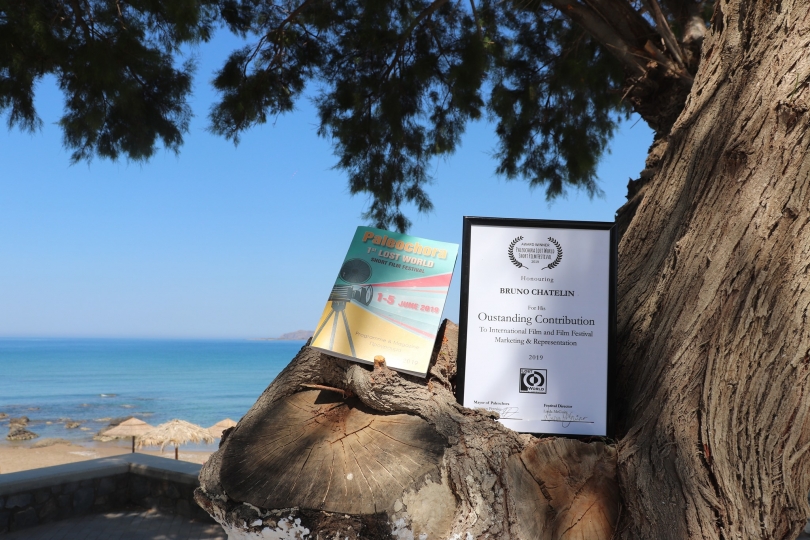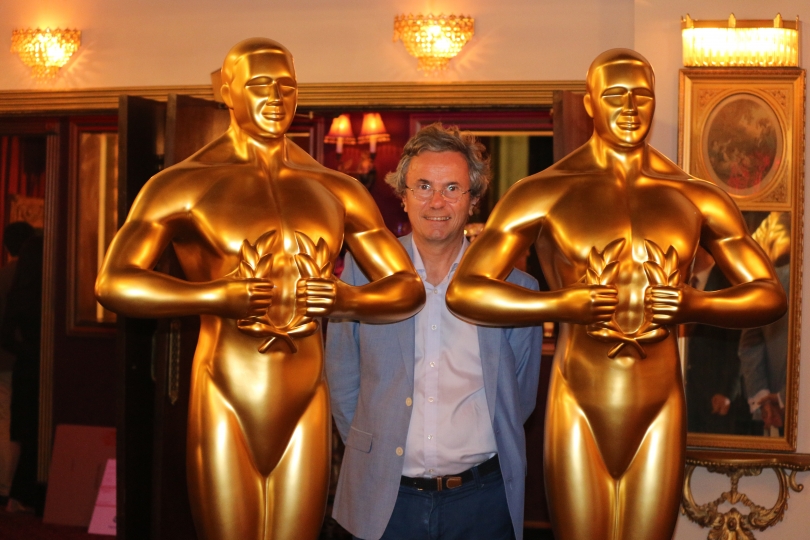Berlinale’s Queer Teddy: Interview with Wieland Speck, Director of the Panorama section and the Teddy Awards
Among the major film festivals the Berlinale, Berlin’s International Film Festival stands out as the first with an official award, the TEDDY, for the best lesbian, gay, bi- and transsexual films, an award which has been granted for the last twenty years. The Venice Film Festival had for two years now the QUEER LION for the best LGBT feature film. The number of LGBT films screened at the berlinale is growing. It included in the 2009 edition 23 feature films, seven documentaries, and nine short films of which 27 were shown in the Panorama section. Modern film history could not be written without paying tribute to those honored with the TEDDY, including to date Pedro Almovar, Gus Van Sant, Francois Ozon, Stanley Kwan, Toddd Haynes , Peggy Rajski, and Tilda Swinton, to name but a few.
Wieland Speck has lived in Berlin since 1982. He studied drama, literature and ethnology and worked on numerous video and film projects with an early focus on the men’s movement and homosexual identity. Among other relevant biographical entries are, managing an independent art house cinema; studies at the San Francisco Art Institute; and positions in several film institutions. As a director, actor , writer or editor he has been identified with acclaimed television and film productions, including , but not restricted to, Die Erika and Klaus Mann Story (Escape to Life), Among Men, Zimmer 303, Die Wahre Geschichte von Maennern und Frauen (The True Story about Men and Women), Die Venusfalle (The Venus Trap), and Westler ( East of the Wall).
Claus Mueller: Wieland you have a long history serving at the berlinale and its teddy awards covering close to 30 years.
Wieland Speck: Certainly, for 28 years I worked as programmer, for 15 as the director [of the Panorama], and in 1981 my first film was shown here. Thus my experience covers 29 years
CM: What are the most important changes you saw over that period?
WS: You certainly had significant changes in society which were in turn reflected in the Panorama, thus we were often spearheading theses changes. Travelling a lot all over the world you are very early exposed, so to speak, as the first one to what the next generation of film makers is producing, you are automatically extremely close to the pulse of the time.
CM: Is that in turn reflected in the change of themes and genres?
WS: I could say no but of course you could also say yes and find thousand of things to say. But I basically I do not see significant changes.
CM: Does the same hold for your Teddy programming and its films over the last twenty years?
WS: There the changes are a little bit more significant, emancipatory changes have occurred. In the Western World we have arrived somewhere at a point we did not really know how to get there. But ‘arrived’ of course gives you also the feeling that this is not reversible, though with caution since there may be contradictory developments.
CM: And we can assume that visual representation of the gay and lesbian life world and the problems faced have contributed to that emancipation?
WS: With respect to the rest of the world of course you could say that. You have countries that would not have dared in the past to deal with gay issues and now there are forced to do so. But the way they deal with it and the complexity of the issues differ,
just take Indonesia as an example. Discussion of these issues did not take place in Indonesia now they do. It depends on the local culture [and politics] which level can be reached on the scale of emancipation.
CM: Over the last years did your programming approach change?
WS: No, not really. It is still the same focus on finding the next art house program for the European distributors. The queer focus is as we all know a constant focus. That’s way the thirty year birthday celebration [of the Panorama] is also a celebration of the queer focus. We are still trying to support those filmmakers who are working on the world. Let us put I in these terms, they are working on the world but not necessarily changing the world.
CM: What about your audience?
WS: The audience has not changed in Berlin. Well, Berlin is more commercial now and it has become more of a regular city. Than it used to be and this is due to east and west, but is still peculiar enough to resemble to what it was before in East and West. So you have all levels. The city is very complex, but not very hysterical and that is a very nice thing. Thus you have an audience that wants to dig into themes, they want more than just bits and pieces, they want more than the internet. This is something which motivates me a lot.
CM: You have a large number of minority groups in Berlin. Do the issues touching the gay community also come up in the Turkish community?
WS : Insofar as filmic expressions are concerned it came up, yet, right now there is no hint. But I hope it comes back in. But as we all know we had a littler freer time ten years ago, some things were freer than they are now. As you know, the same holds especially for the United States.
CM: Such as?
WS: Being very blunt or fresh about certain issues, especially emancipatory ones. Look if you do something for the first time you have a lot more freedom than when you try to establish it or when you think you have established it on the lowest level. To go further is more complicated. Before nobody knew who gay people were, gay people had in some parts more freedom. You need to talk about the need to change the structure of society, once you change the structure everybody knows who the gay people are. Now we have ten year olds using course words and bullying kids of they own age as gays. That we did not have ten years ago.
CM: Are you saying that a consequence of the process of emancipation at large there will be an accommodation of the gay community to society? Put differently you leave the gay ghetto and fade into society
WS: Not really. For once we never had a gay ghetto. For a while we were talking about the [gay] community, but that was totally implanted/derived from the American way of thinking. Now no one hear hardly talks about the community since reality has shown that that terminology was for while a nice motor for certain kinds of behavior specifically for the outside. But you really cannot argue that there is a body of [gay] people with the same characteristics. That does not exist.
CM: One could add that across society you can observe a tremendous decline of communities. Individuals sort of becoming disconnected and the social networks are shrinking. Thus it would be problematic to talk about a gay community.
WS: You are certainly correct. That also accounts for fundamentalists coming into society and appealing to people who want to belong to something
CM: Or want to believe in something?
WS: Well I do not experience the need to have to believe in something. I want to belong but that I can certainly rationalize and analyze.
CM: The stronger your ego identity is the less there is internal pressure to join a ‘community’ or to adopt a belief. If the identify is precarious you want to be part of something. Let me return to an old question, what about the flood of films submitted to you?
WS: Well I have less than ever oversight now though I am working closely with people I trust. I do not have the grasp of the films they have seen. Nor do I have knowledge of the full spectrum of films [submitted], but that may have rarely been the case anyhow, even under Manfred Salzberger [director of Panorama through 1992] who was the ‘film eater’ of the world. Nowadays there is a lot I do not know what happens on the way [of selection] which is a bit awkward. But having more films does not necessarily mean that originality has made a major jump.
CM: Certainly not. All film festival directors I have interviewed to date, be it Dieter Kosslick, Richard Pena, Sara Hoch, or Peter Scarlett agree that there is a growing discrepancy between the number of films produced and the number that are original and creative.
WS: Correct, you had a certain kind of film and a certain number of productions [fitting it]. Now the whole field has become bigger. This is especially true for middle class films, as they call them, frequently called by the makers independent, money coming from different sources, stories and plot lines attached, and they need a place. They think it could go to the cinema, yes it could, but there are too many of those films and they just do not grab me.
CM: To return to the gay theme, though it is difficult to measure what do you think has been the impact of having the Teddy section at the Berlin film festival, the only major film festival with such a program? For example educating or emancipating the Berlin film going audience at large?
WS: Well you have in Venice one [a queer award] now too. But definitely the Teddy has had an impact at the festival. Nowadays each section of the festival proudly sends us the list of films with a gay or lesbian theme. Thus it has become normal to show such films, though it has taken decades of hard work to get to that point. It also shows how incredible persistent you have to be. They [the other programmers] know everything; they actually label the films by placing a small or large G [gay], L [lesbian], T [transgender] and so on the boxes.
CM: Do these films have an audience beyond the captive [gay, lesbian, transgender] groups?
WS: Most films do, but there are certain films which are specifically targeted to a niche audience. This does not mean the queer audience is a niche audience. The queer audience consists to 10% of queer peoples and the rest are their heterosexual friends. The niche audience refers to groups drawn to certain films with narrowed down themes which I normally show in Cinemax 7 during late night shows serving a specific audience, or also show them at the Cinestar venues.
CM: In the interview with Beki Probst [Director of the European Film Market] earlier today the importance of the current economic context for of the Berlin Film Festival transpired. Dieter Kosslick mentioned in a television interview that there has been this year some decline in festival funding and the panelists of the co-production seminar seemed to agree that there will be less film revenues and film funding in the business. Thus observer anticipates a melt down in the number of films produced. According to Probst fewer productions will result in an upscaling of quality. Do you agree with that assessment?
WS: For me it would be a little futuristic to make a comment. But, in terms of quality,
these middle ground films [in the $20-45 million range], the dependent independents
as I call them, were blocking all the screens and created a situation when too many films started. Thus the critics could not possibly cover each film that was released. When this field shrinks it creates a situation when the real independent films can come through again since we have the infrastructure to show their productions. That is my take on the future of quality; we will be dealing with more radical productions. Actually it is a very good moment for independent cinema. At the first time in the past ten years film making has become so much cheaper than ever to produce.
CM: Yes but it has to be qualified. When talking with people funding productions or optioning scripts one frequently comes across the observation that there has been an overall drop in the quality of submitted projects and films. Apart from other factors, there is an apparent lack of authenticity in what is written or produced. This in turn seems to reflect the phenomenon that much of what is written and filmed is not based on real experience in society but on second hand or secondary experience such as television etc. You cannot write in an authentic fashion about gay love if you have never experienced it. Thus you may have more possibilities of producing, you may have more platforms of distribution, but something is lacking. Thus it is a contradictory situation.
WS: Actually a valid point we need to take into account.
CM: Do you anticipate any changes in the Panorama?
WS: The dynamics of my work comes from my contacts and these contacts are new each year. Thus by definition I do not have to worry about the dynamics unless the world decides to make only boring films. Which will never happen?
CM: What about the Teddy?
WS: Queer people will never be emancipated so the Teddy does not have to worry either.
CM: On that note thank you
Claus Mueller
New York Correspondent
filmexchange@gmail.com

 Chatelin Bruno
Chatelin Bruno 














